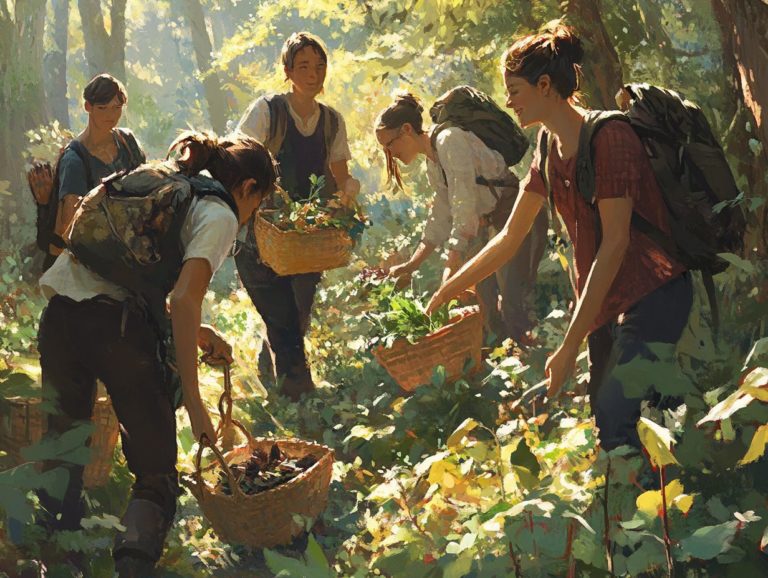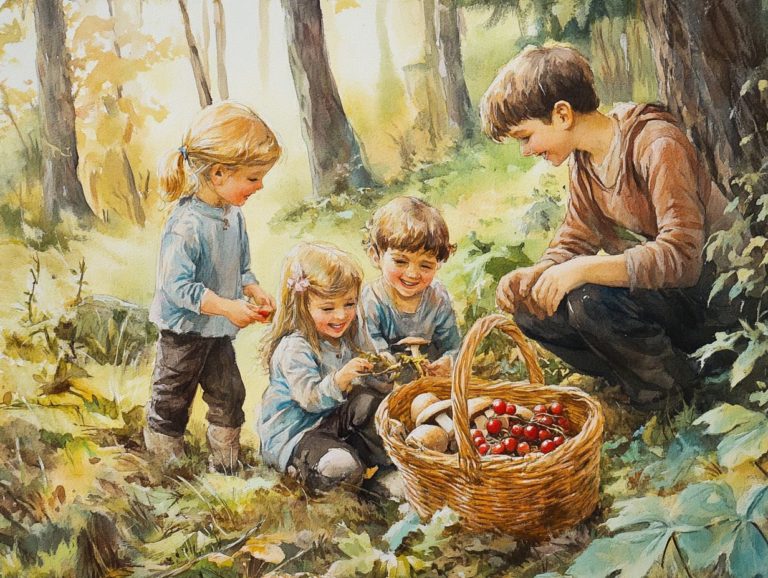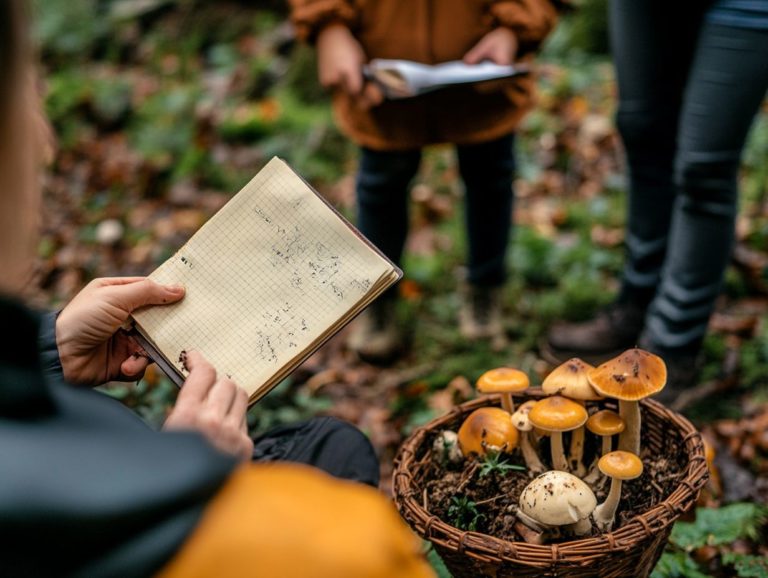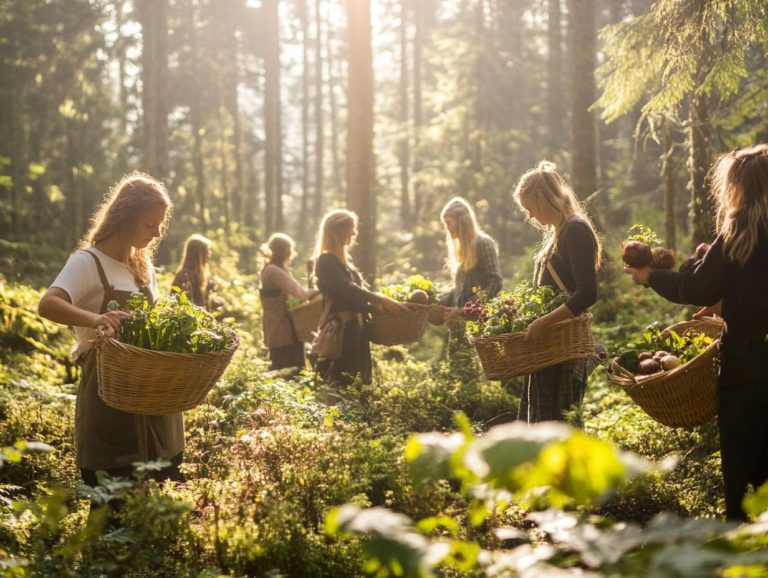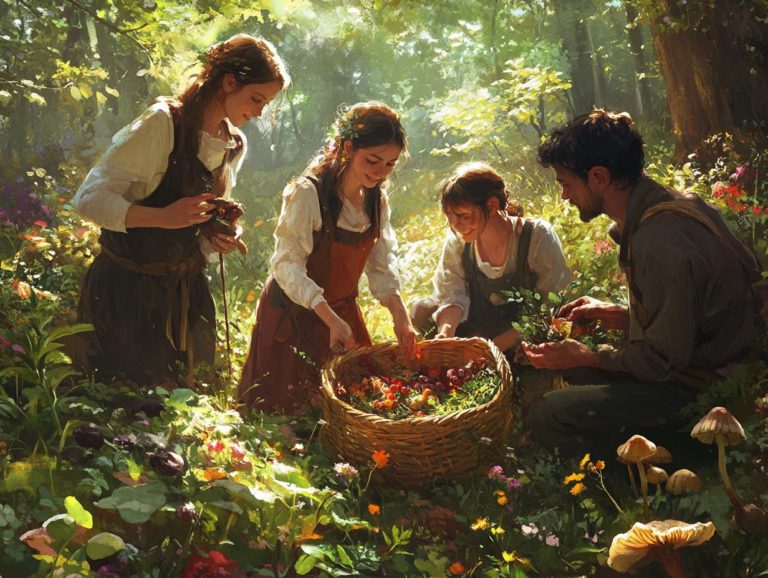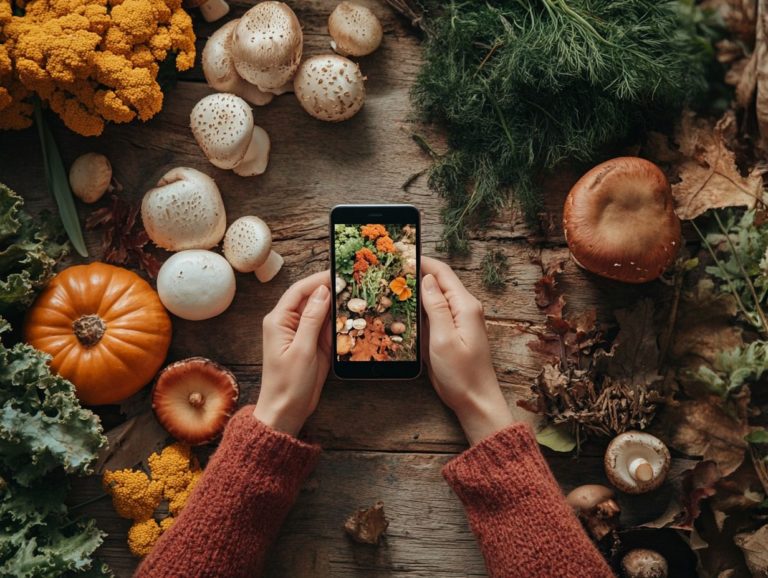5 Benefits of Joining a Foraging Club
Foraging has emerged as a captivating pursuit that offers a remarkable opportunity to connect with nature and uncover edible treasures right in your own backyard. By joining a foraging club, you can greatly enhance your foraging adventures! Not only will you gain valuable insights into local plants and their uses, but you ll also have the support of a vibrant community filled with fellow enthusiasts.
The benefits abound, from accessing private lands for your foraging adventures to learning sustainable practices to ensure you leave no trace. Discover how becoming part of a foraging club can profoundly enrich your outdoor experiences.
Contents
Key Takeaways:
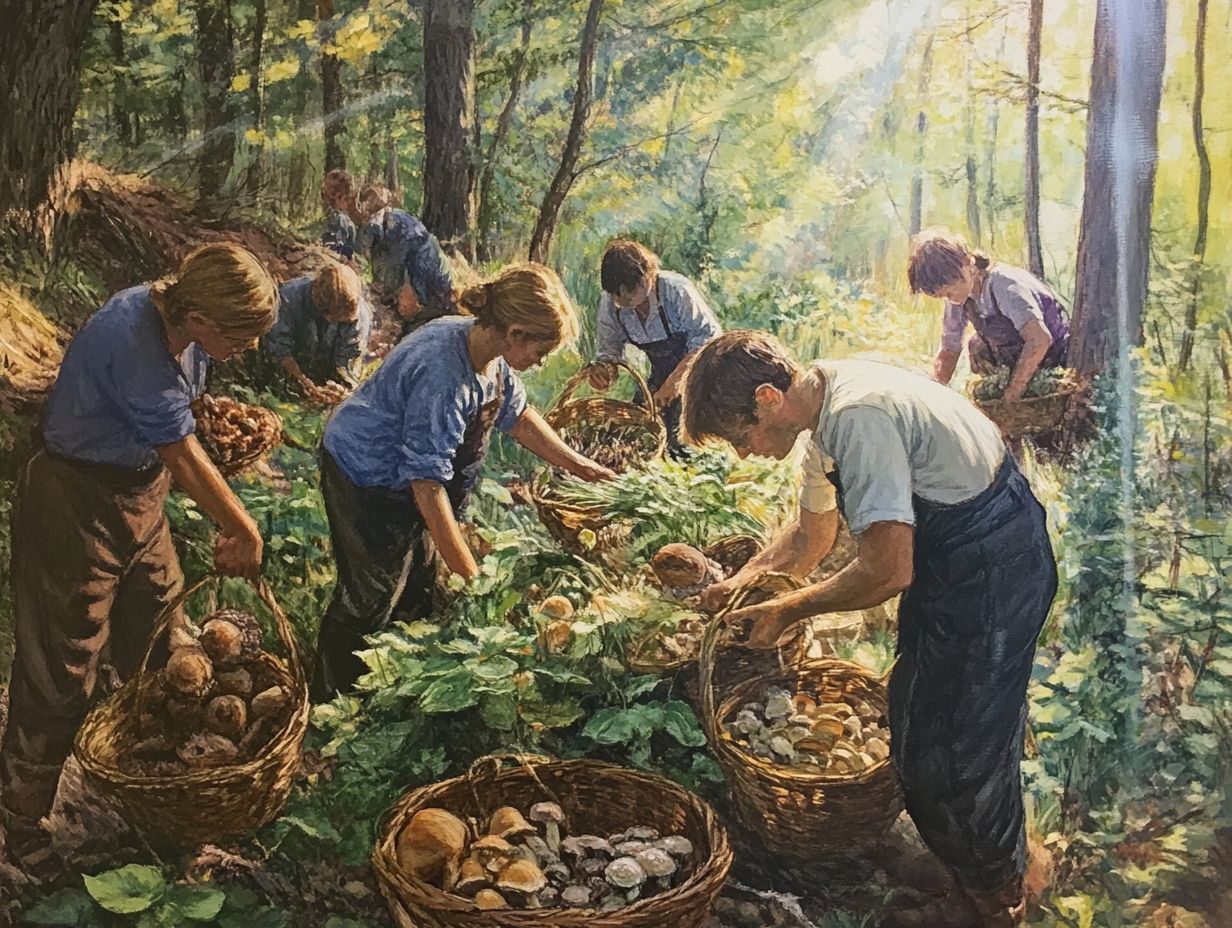
- Learn about local plants and their uses from experienced foragers in a club setting.
- Connect with like-minded individuals who share a passion for foraging and nature.
- Gain access to private land for foraging, increasing the variety of plants available.
1. Learn About Local Plants and Their Uses
Understanding local plants and their myriad uses is crucial for anyone intrigued by foraging. This pursuit deepens your appreciation for wild foods and ties you to historical practices and traditional medicines that humans have relied upon for centuries, particularly in regions like California and Texas, where a rich diversity of flora flourishes.
In these vibrant ecosystems, you’ll uncover edible treasures like dandelion greens, brimming with vitamins A and K, and wild garlic, celebrated for its heart-healthy properties. The art of foraging is steeped in tradition, passing down valuable knowledge about these nutritional plants.
Today, many are inspired by foragers like Mo Wilde, who champions the integration of wild foods into contemporary diets. These wild edibles are not just packed with antioxidants to help fight oxidative stress; they also foster a deeper connection to the environment.
By embracing these time-honored practices, you can cultivate a newfound appreciation for nature s bounty and the countless health benefits it offers.
2. Connect with Like-Minded Individuals
Joining foraging groups gives you the chance to connect with fellow enthusiasts, creating a sense of community that celebrates cooking traditions and highlights the importance of local and organic food much like the rich foraging heritage found in Italian culture.
Through collaborative workshops, you ll master the essentials of identifying edible plants. Group foraging trips immerse you in practical experiences across diverse environments, enhancing your understanding of sustainable practices.
By tapping into the wisdom of various cooking traditions, particularly those surrounding wild mushrooms and herbs, you can craft dishes that are deeply rooted in your local ecosystems. This journey promotes healthier eating habits and encourages a mindful approach to sourcing food, advocating for environmental responsibility every step of the way.
3. Access to Private Land for Foraging
Gaining access to private land for foraging can elevate your experience, unveiling diverse ecosystems brimming with free food options. It also highlights the necessity of adhering to rules for picking plants safely and responsibly, ensuring sustainable practices and bolstering food security.
When you seek permission to forage on private properties, you’re unlocking the potential of untouched flora. You re also building relationships with landowners and nurturing a sense of community.
This respectful approach emphasizes the importance of harmonizing human activity with nature. Embracing ethical foraging practices aids in preserving local plant diversity, ensuring that wild plants flourish for generations to come.
By recognizing the delicate balance between harvesting and conservation, you can relish your foraging adventures while actively supporting sustainable ecosystems that enhance food security within your community.
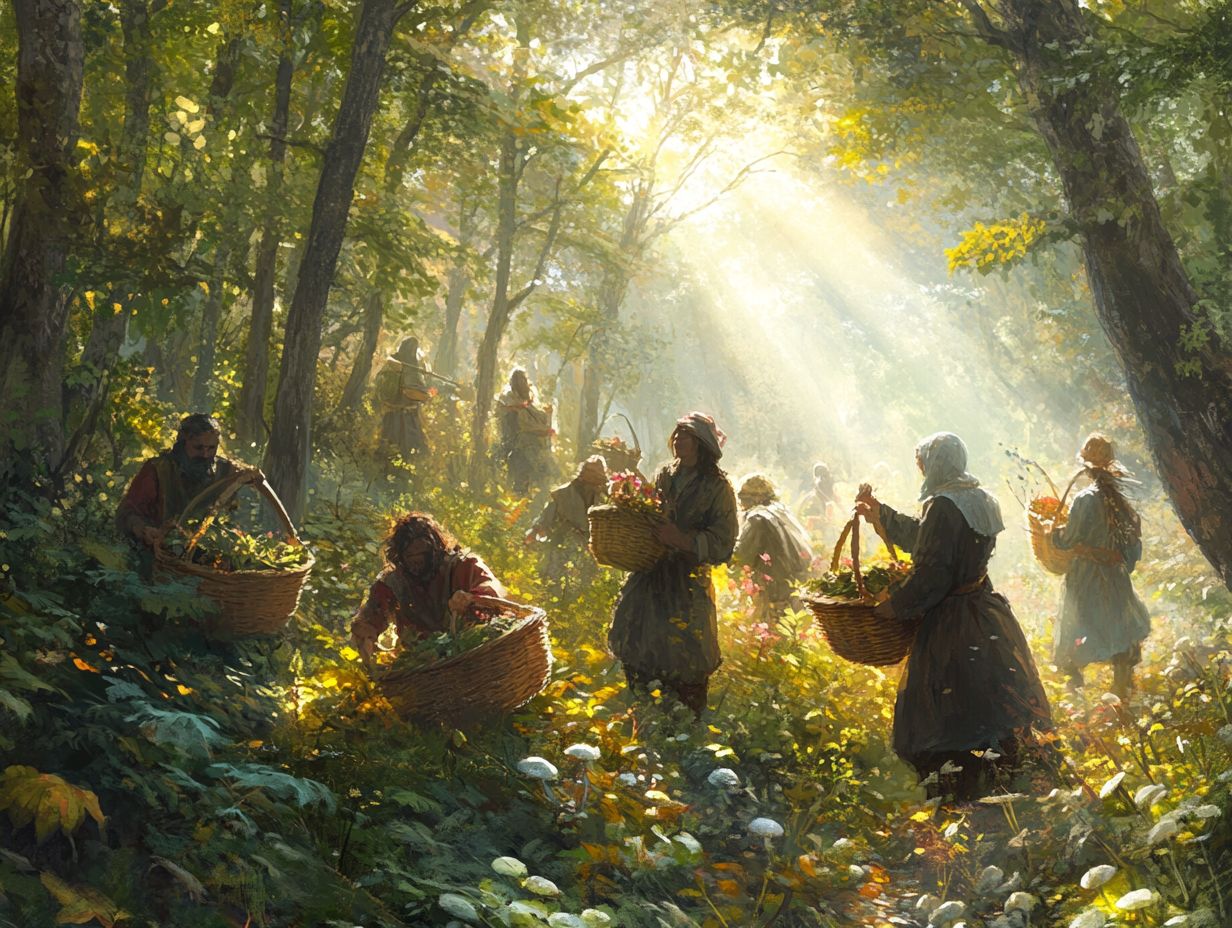
Sharing and learning new foraging techniques enriches your knowledge. It also strengthens community bonds, especially in mushroom foraging.
These skills include methods for safely identifying edible mushrooms, such as examining physical characteristics like color, shape, and habitat. Participating in workshops or group events allows you to practice these techniques alongside others, fostering a sense of community and shared responsibility.
By prioritizing sustainable practices, you minimize your impact on the environment. This collective approach enhances your culinary repertoire and preserves essential ecological knowledge for future generations.
5. Support Sustainable and Ethical Foraging Practices
Supporting sustainable and ethical foraging practices is vital for our planet. It helps maintain healthy ecosystems, fosters community connections, and maximizes health benefits from wild foods.
Follow guidelines for responsible gathering to protect our natural spaces. This means taking only what you need, leaving enough for wildlife, and being mindful of seasonal growth patterns.
Community initiatives like foraging workshops and nature conservation groups are gaining popularity. These activities deepen your connection to the environment and cultivate a greater appreciation for nature s bounty.
What Is a Foraging Club and How Does It Work?
A foraging club is your gateway to a vibrant community where fellow enthusiasts gather to explore the art of foraging. If you’re interested in getting involved, you can learn how to join local foraging groups for sustainability. Here, you’ll dive into activities like mushroom foraging, drawing from both time-honored traditions and contemporary techniques.
As a member, you ll participate in workshops that focus on recognizing edible plants and practicing sustainable harvesting. Regular events, including seasonal foraging excursions and potluck feasts filled with your freshly discovered finds, will cultivate camaraderie among you and your fellow participants.
Experienced members serve as invaluable mentors, generously sharing their expertise. By fostering collaboration and open communication, these clubs enhance your skills and promote a collective appreciation for the natural abundance that surrounds you.
What Are the Benefits of Foraging for Food?
Foraging for food provides a wealth of benefits. You gain access to free sustenance while enhancing your health with wild, nutrient-rich plants.
Beyond the financial savings, you ll uncover vitamins and antioxidants found in wild edibles, significantly contributing to your overall wellness. Incorporating these natural foods into your diet can improve your immunity and increase your energy levels.
This engaging activity often leads to meaningful interactions with fellow community members. Sharing tips, recipes, and foraging spots strengthens social ties and promotes a lifestyle grounded in ecological mindfulness.
What Are the Risks and Safety Measures Involved in Foraging?
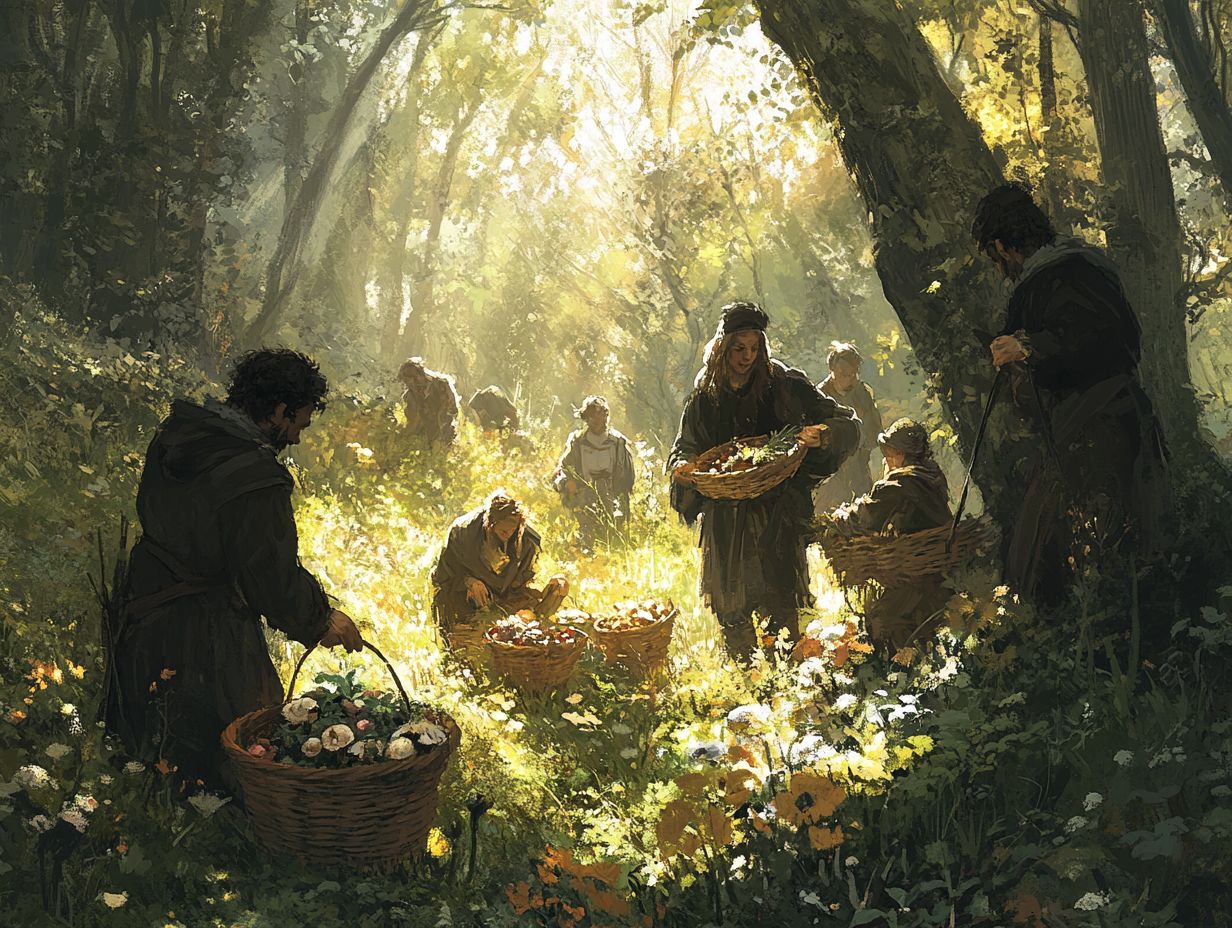
Foraging can be an incredibly rewarding experience. However, it s crucial for you to understand the risks involved and take safety measures. This way, you can confidently identify wild and edible plants while steering clear of poisonous varieties.
One of the most significant dangers is misidentifying plants, as many edible species have toxic look-alikes. To mitigate this risk, consider using reputable field guides, attending foraging workshops, or joining local foraging groups. These resources offer invaluable insights that help you learn how to distinguish safe plants from harmful ones.
Understanding the ecosystem and the specific habitats where certain plants thrive is essential in your journey. It s also wise to start with a small selection of easily recognizable plants before expanding your repertoire.
By emphasizing patience and respect for nature, you ll not only ensure a safer foraging experience but also enjoy more fulfilling adventures along the way.
How Can a Foraging Club Help Beginners Get Started?
Foraging clubs are essential for helping you embark on your foraging journey. They provide guidance, resources, and community connections you need to embrace sustainable practices and develop a genuine appreciation for wild foraging benefits.
These clubs host engaging workshops designed to educate you on identifying edible plants and understanding their ecological importance. Guided foraging excursions offer hands-on experiences in nature, allowing you to practice your skills in real-time under the watchful eye of knowledgeable mentors.
Such interactions speed up your learning process and help you build a supportive network. You can connect with seasoned foragers eager to share invaluable tips and insights. This sense of community ensures you feel encouraged and empowered, setting the stage for a deeper mastery of foraging techniques while emphasizing the critical importance of safety and sustainability.
What Are Some Common Misconceptions About Foraging?
Common misconceptions about foraging can easily mislead you. For instance, the idea that all wild plants are safe to eat highlights the necessity of grasping responsible foraging practices and accurately identifying edible plants.
These misunderstandings can lead to dangerous outcomes. Consuming a toxic plant can result in serious health issues. The notion that foraging is merely about picking whatever looks appealing overlooks your ethical responsibility to preserve ecosystems.
You must educate yourself on the local flora and respect harvesting limits. Many new foragers might not realize that certain species are protected or that overharvesting can seriously harm habitats.
A thorough education enhances your safety and nurtures a deeper appreciation for nature, ultimately promoting sustainable practices and responsible stewardship of wild resources.
How Can Joining a Foraging Club Benefit the Environment?
Joining a foraging club can offer you remarkable benefits while positively impacting the environment. By promoting sustainable practices and enhancing your awareness of local ecosystems, you can also explore 5 foraging clubs to join this year that foster community connections centered around shared stewardship, allowing you to engage in something truly meaningful.
These clubs frequently organize informative workshops and hands-on experiences designed to deepen your understanding of the diverse plant and animal life in your region. As you learn to identify native species and appreciate their roles within the ecosystem, your connection to nature grows stronger.
By practicing responsible foraging techniques, you minimize your ecological footprint and savor the abundance around you. This collaborative endeavor protects local biodiversity and nurtures a sense of responsibility toward conserving natural resources, ensuring these essential ecosystems thrive for generations to come.
Frequently Asked Questions
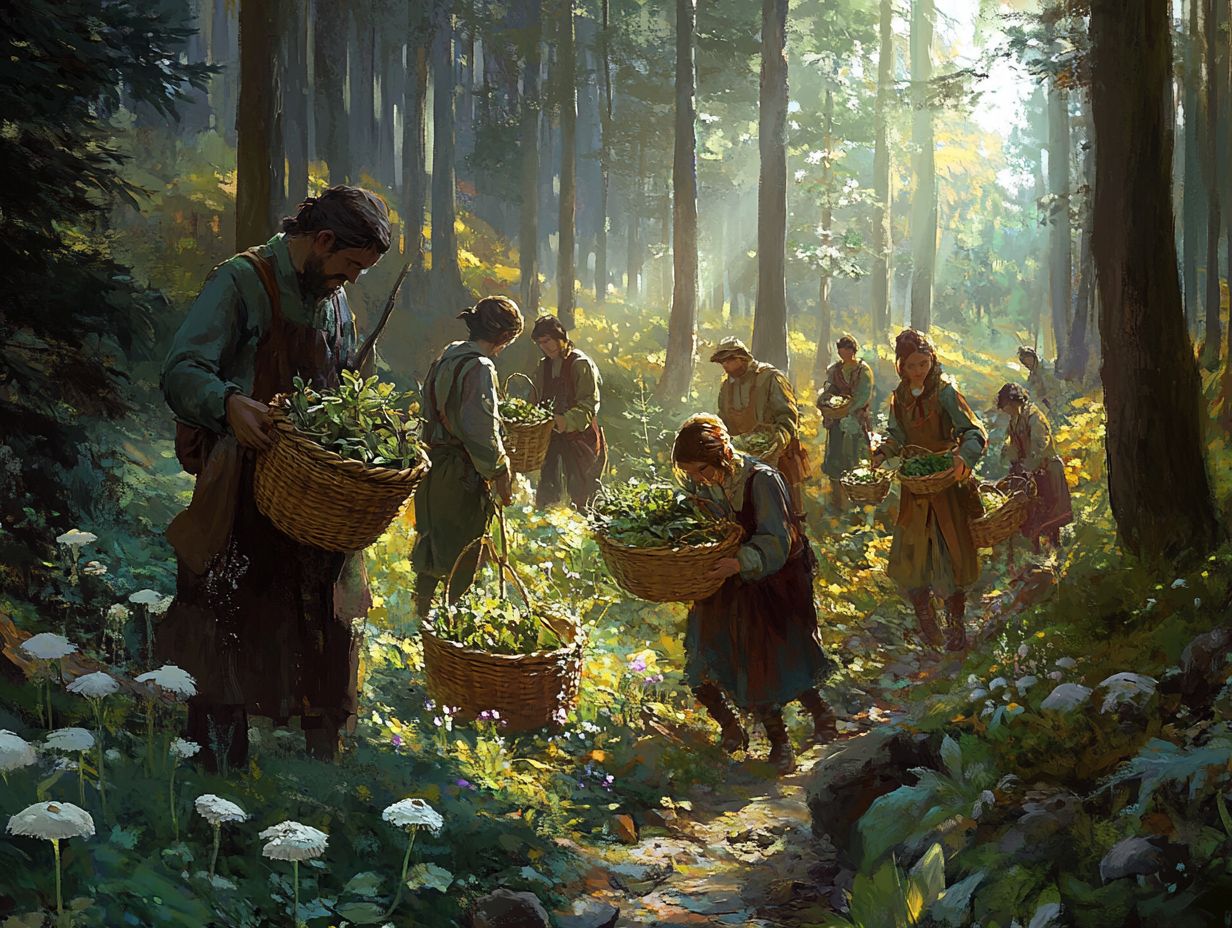
Ready to dive into the world of foraging? Join a local foraging club or attend a workshop today!
What is a foraging club?
A foraging club is a group of people who gather to learn and share about foraging, including wild edible plants, mushrooms, and other natural resources. Joining such a club can help you understand the benefits of foraging in urban areas.
What are the benefits of joining a foraging club?
1. Expand your knowledge: By joining a foraging club, you can learn from experienced foragers and broaden your understanding of wild edible plants and mushrooms. Consider checking out these tips for starting your own foraging group to connect with others who share your interests.
2. Meet like-minded people: Foraging clubs help you meet new people who love nature and foraging.
3. Access to new foraging locations: Members eagerly share hidden foraging treasures, giving you new spots to explore!
4. Safety in numbers: Foraging alone can be risky, especially for beginners. Joining a foraging club allows you to forage in a group, ensuring safety. Check out these 5 reasons to attend a foraging meetup for more benefits.
5. Get involved in conservation efforts: Many foraging clubs focus on conservation and sustainable foraging practices. To enhance your knowledge, check out these top tips for successful foraging, which lets you contribute to important environmental efforts.
Is foraging legal?
Foraging laws vary by location, so it’s important to do your research and follow all local regulations. Joining a foraging club can provide you with valuable information about foraging laws in your area.
Do I need to be an experienced forager to join a foraging club?
No, most foraging clubs welcome individuals of all skill levels. Whether you’re a beginner or an experienced forager, you can benefit from the shared knowledge and resources within the club.
What activities are typically involved in a foraging club?
Foraging clubs often organize group foraging trips, workshops, and educational sessions on topics like plant identification, sustainable foraging practices, and community foraging projects involving cooking with wild edibles.
How can I find a foraging club in my area?
Don t wait! Search online for local foraging clubs today. Check community centers, nature parks, and social media to connect with fellow foragers!

